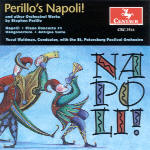Stephen Perillo’s music really deserves a wider audience, as its characterful combination of deliberately mundane thematic material, satirical or ironic whimsy, colorful orchestration, and vivacious rhythmic energy suggest a sort of less-pretentious Alfred Schnittke, or perhaps Poulenc on steroids. Napoli! obviously evokes the sunny Italy of Perillo’s ancestry (and livelihood: in real life he manages a well-known travel firm), with faux-Neapolitan tunes clothed in often-deranged instrumental dress. The result, alternately innocent and ominous, bears a striking conceptual resemblance to works such as Schnittke’s poly-stylistic (K)ein Sommernachtstraum. Poulenc inhabits the world of Piano Concerto No. 1, nowhere more so than in its lovely, neo-classical (sort of) slow movement. Like his illustrious French predecessor, Perillo has a real talent for seamlessly gliding in and out of any number of seemingly irreconcilable idioms. Nina Kogan, daughter of the famous Russian violinist Leonid Kogan, plays the solo part on a wooden-toned, backwardly balanced instrument and isn’t credited anywhere but in the booklet notes, but she manages to sound lively and involved all the same. The zany outer movements, though, really do cry out for a more brilliant recording of the piano.
Hangoverture, written to celebrate the new millennium, aptly lives up to its title. It consists of a potpourri of tunes in various styles, ranging from a drunken waltz to symphonic jazz. Like most of Perillo’s work, its celebratory character seems frequently tempered by ominous undercurrents, and this duality validates much thematic invention that might otherwise simply sound trite. In other words, Perillo knows exactly what he’s doing, an impression confirmed by the delicious Antique Suite. The five brief pieces that comprise the complete work include a wonderfully lyrical central Canzone and a fourth movement (entitled “Arpeggios”) in which Brahms’ Academic Festival Overture rubs shoulders with the fugato from the famous Allegretto of Beethoven’s Seventh. Perillo also tosses a harpsichord into the pot to add spice to the orchestration. The suite is a real charmer.
As noted above, the sonics aren’t quite ideal: clear, but a touch dry, especially in the Piano Concerto. Still, given his role as this disc’s producer, we can assume that Perillo got more or less exactly what he wanted from the very capable conductor, Yuval Waldman, and his Russian players. This release only confirms the favorable impression made by the first disc of Perillo’s music on Centaur. Here’s a composer with no harmful inhibitions, speaking in his own personal voice, and despite the similarities to other composers noted above for the sake of comparison, the peculiar mixture of elements that comprises Perillo’s language really sounds like no one else. He’s definitely worth a listen, particularly if you have an open mind and a sense of humor.
































